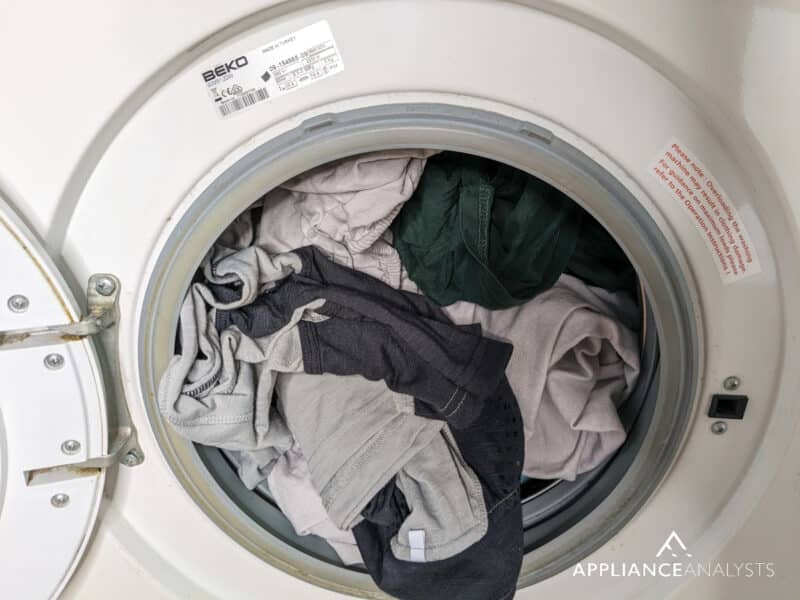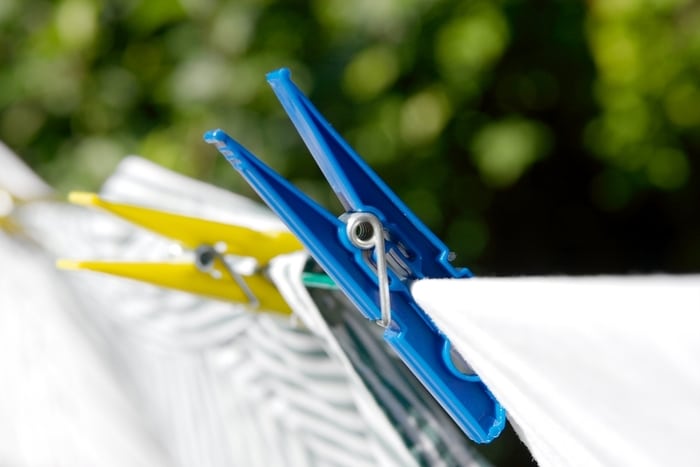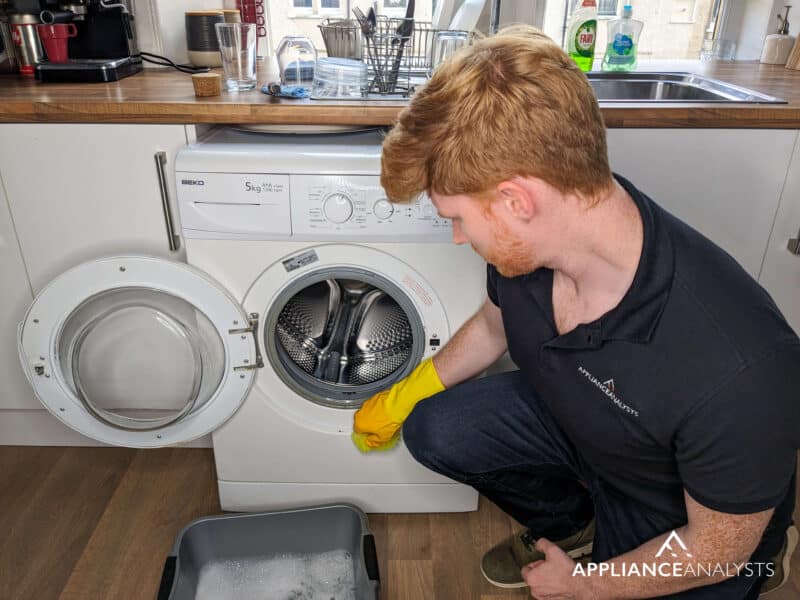We've independently reviewed this article to make sure it's as accurate as we can make it.
To find out more about our article creation and review process, check out our editorial guidelines.
Have you ever wondered how much your washer costs to run?
You’re not alone! With electricity prices skyrocketing in the last few years, more and more people are concerned about how much they’ll pay to do their laundry.
It’s estimated that about 85% of U.S. households today own a washer, so it’s worth looking at their average power draw to determine how much they contribute to your monthly bills.
In the washer calculator below, you can input your washer’s characteristics, such as type, size, and the number of times per week you use it. By the end, you’ll have all the answers you came for.
Keep reading to keep your bills in check!
How Much Your Washer Costs to Run
No matter how you run your washer, it will not burn a hole in your pocket. On average, washers cost between $15 and $60 per year to run. If you divide the yearly cost by month, it adds up to about $1.25 and $5.00, which isn’t too bad.
The cost of running your washer can, of course, vary. Mostly depending on your state, as tariffs change by location.
The Washer Calculator
How I’ve Estimated Washer Running Costs
I analyzed EnergyStar data from over 330 washers to create our washer calculator. I gave an approximate electricity and water cost per load from the washer data.
During the research process, I found a correlation between the type of washer and the size of the drum with how much electricity and water they use. I also included a factor considering the appliance type since, in my experience, front-load and top-load washers tend to have different resource consumption.
How to Lower Your Washer’s Running Costs
Lowering your washer’s running costs is always welcome – even when you’re already resting a little easier, knowing your washer does not represent a big chunk of your electricity bill.
You can implement many good practices into your daily routine to lower your washer’s running costs and keep it in good condition. My usual advice is to start incorporating good practices gradually so that they’re second nature to you after a couple of weeks.
#1 Wash Full Loads
Washing full loads can help improve the results you got from the washer calculator above. Many people throw their clothes/duvets in the hamper and do the laundry every couple of days without actually waiting to wash a full load.
Personally, I think that’s a waste of time and resources!

I understand how sometimes you can’t wait to wash something, as you might have an important meeting, a date, or any other event that calls for specific garments. But whenever possible, try to wait at least an extra day or two before washing.
The problem with not waiting is that your washer will normally use the same amount of electricity and water to wash a couple of t-shirts or several lbs of clothing, so if you want to maximize efficiency, be patient.
#2 Use Cold Water
Using cold water during a washer cycle can further improve your results from the washer calculator.
When you choose to forego warm or hot water for your washing cycles, you’re making your appliance’s job easier, as the washer doesn’t have to go through the trouble of increasing the water’s temperature.
You might not notice the differences immediately, but within a year, you’ll save a couple of dozen dollars by changing one simple setting.
Just ensure that before you set your washer to use cold water, you check that all your clothes can be washed at lower temperatures, as some fabrics, like spandex, nylon, and polyester, are typically easier to wash in warm water.
#3 Try Eco Mode
Eco Mode can help save you hundreds of dollars over the years and significantly lower the cost of running your washer.
Eco Mode is designed to use fewer resources while providing virtually the same performance and results. From what I’ve seen, sometimes the washing cycles can take a little longer, or the water used might not be as warm, but at the end of the day, the differences between Eco and regular modes are hardly noticeable.
To know whether your appliance has an Eco Mode, check your User Manual. Feel free to use our resource below to help make the search easier.
#4 Consider Air Drying
Air drying might make you feel like you’re living in the early 1900s, but it can further improve your results from the washer calculator.

I get that air drying can be inconvenient, and clothes take a lot longer to dry than they would by simply throwing them in the dryer, but have you considered how much electricity and gas you could save?
#5 Avoid Lint Accumulation
Removing lint from your washer often is one of the easiest and fastest ways to lower the costs of running it.
During a washer cycle, clothes wear out slowly but surely. Over time, the lint that falls out of your clothes during a washer cycle builds up and can significantly impact how your washer works and how much it costs to run.

Lint accumulation within your washer can not only cause it to overheat or not clean as well as it should, but also force it to use more water and electricity to get the job done.
So, if you want to ensure that your washer’s working properly and according to its designed capabilities, it’s crucial that you clean the appliance thoroughly at least once a month.
Conclusion
That about covers it!
Determining how much it costs to run your washer can be tricky, as washers come in all shapes and sizes.
I hope this piece has helped you better understand how much you’re paying monthly to wash your fabrics and what you can do to take efficiency to the next level. In many cases, something as simple as ensuring the unit is clean, washing with cold water, and using Eco Modes can go a long way.
Thank you very much for sticking with me all the way to the end. If this article piqued your interest and answered your questions, please check out our other incredible resources below and consider subscribing to our newsletter.
On the site, you can find useful buyer’s guides, DIY tips, and solutions for all sorts of issues, such as a washer that’s always filling with water.
I wish you nothing but the best.
— Craig.








